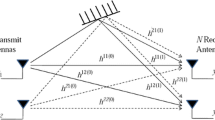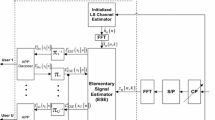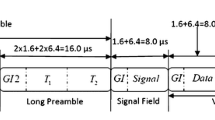Abstract
A robust recursive least square (RRLS) algorithm that has been designed for SISO communications by Bhotto and Antoniou (IEEE Signal Process Lett 18(3):185–188, 2011) is unable to work for MIMO system because of single error constraint. In this paper, a modified version of RRLS algorithm with the application of MIMO channel estimation is introduced. An RRLS algorithm is modified in such a way that it can provide much faster convergence rate in MIMO channel estimation than that of RLS and variable forgetting factor RLS (VFF-RLS) algorithms. Moreover, the optimum forgetting factor is derived for MIMO RRLS in order to minimize the error function. Simulation results show that the MIMO RRLS provides fast convergence performance as compared to RLS and VFF-RLS algorithms without additional multiplication complexity, however, an additional linear term of N in the addition complexity of modified MIMO RRLS does not enhance its computational complexity and keeps it almost equivalent to those of RLS and VFF-RLS algorithms. Moreover, it is observed that the optimum forgetting factor is highly dependent on RRLS scaling parameter, \(E_b/N_o\), doppler shift and number of antennas.







Similar content being viewed by others
References
Bhotto, M. Z. A., & Antoniou, A. (2011). Robust recursive least-squares adaptive-filtering algorithm for impulsive-noise environments. IEEE Signal Processing Letters, 18(3), 185–188.
Pelekanakis, K., & Chitre, M. (2015). Robust equalization of mobile underwater acoustic channels. IEEE Journal of Oceanic Engineering, 40(4), 775–784.
Subudhi, B., & Pradhan, R. (2016). An adaptive predictive error filter based maximum power point tracking algorithm for a photovoltaic system. The Journal of Engineering, 2016(4), 54–61.
Raza, H., & Khan, N. M. (2017). Low complexity linear channel estimation for MIMO communication systems. Wireless Personal Communications, 97(4), 5031–5044.
Foschini, G. J., & Gans, M. J. (1988). On limits of wireless communications in a fading environment when using multiple antennas. Wireless Personal Communicaitons, 6(3), 311–335.
Pohl, V., Nguyen, P. H., Jungnickel, V., & Von Helmolt, C. (2003). How often channel estimation is needed in MIMO systems. In Proceedings of the IEEE telecommunications conference (pp. 814–818). San Francisco, CA, USA.
Tong, L. (1995). Blind sequence estimation. IEEE Transactions on Communications, 43(12), 2986–2994.
Vosoughi, A., & Scaglione, A. (2003). Channel estimation for precoded MIMO systems. In Proceedings of the IEEE workshop statistical signal process (pp. 442–445). St. Louis, MO, USA.
Bergman, N. (1999). Recursive Bayesian estimation, Department of Electrical Engineering, Linkoping University, Linkoping Studies in Science and Technology. Doctoral dissertation, 579, 11.
Boroujeny, B. F. (2013). Adaptive Filters: Theory and Applications. New York: Wiley.
Haykin, S. (2013). Adaptive filter theory. Pearson: Prentice Hall.
Sayed, A. H. (2008). Adaptive filters. Hoboken, NJ: Wiley.
Verhaegen, M., & Verdult, V. (2012). Filtering and system identification, a least squares approach. New York: Cambridge University Press.
Kovacevic, B., Banjac, Z., & Milosavljevic, M. (2013). Adaptive digital filters. Berlin: Springer.
Basseville, M., & Benveniste, A. (1986). Detection of abrupt changes in signals and dynamical systems. Berlin: Springer.
Arablouei, R., & Dogancay, K. (2011). Modified RLS algorithm with enhanced tracking capability for MIMO channel estimation. Electronics Letters, 47(19), 1101–1103.
Paleologu, C., Benesty, J., & Ciochina, S. (2008). A robust variable forgetting factor recursive least-squares algorithm for system identification. IEEE Signal Process Letters, 15, 597–600.
Akino, T. K. (2008). Optimum-weighted RLS channel estimation for rapid fading MIMO channels. IEEE Transactions on Wireless Communications, 7(11), 4248–4260.
Leung, S. H., & So, C. F. (2005). Gradient-based variable forgetting factor RLS algorithm in time-varying environments. IEEE Transactions on Signal Processing, 53(8), 3141–3150.
Tylavsky, D. J., & Sohie, G. R. (1986). Generalization of the Matrix Inversion Lemma. In Proceedings of IEEE, San Fransisco, CA USA (Vol. 74, No. 7, pp. 1050–1052).
Komninakis, C., Fragouli, C., Sayed, A. H., & Wesel, R. D. (2002). Multi-input multi-output fading channel tracking and equalization using Kalman estimation. IEEE Transactions on Signal Processing, 50(5), 1065–1076.
Anderson, T. W. (2007). An introduction to multivariate statistical analysis. Hoboken: Wiley.
Author information
Authors and Affiliations
Corresponding author
Additional information
Publisher's Note
Springer Nature remains neutral with regard to jurisdictional claims in published maps and institutional affiliations.
Rights and permissions
About this article
Cite this article
Raza, H., Khan, N.M. Tracking Performance of Robust RLS Algorithm for MIMO Channel Estimation. Wireless Pers Commun 111, 395–409 (2020). https://doi.org/10.1007/s11277-019-06865-2
Published:
Issue Date:
DOI: https://doi.org/10.1007/s11277-019-06865-2




